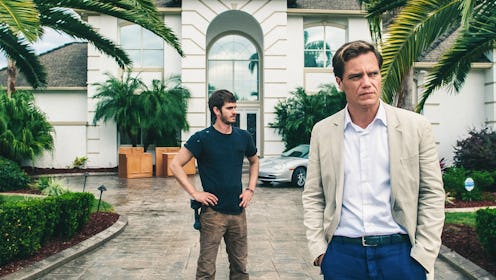
The American Dream is up for grabs in 99 Homes , but at what cost? The new film, inspired by the housing crisis of 2007-2008 and the economic collapse that followed, tells the story of Dennis Nash, a young man played by Andrew Garfield, struggling to keep his family in their house as the crash leaves him in a hopeless debt. With Michael Shannon co-starring as Rick Carver, a real estate broker who works for the banks repossessing homes and flipping houses in the aftermath of the devastating crash, it's a harrowing look at today's economy — and the lengths people will go to to keep their lives afloat.
In this movie, nothing is black and white. Carver, always coiffed and immaculately dressed in fresh-pressed suits and shiny shoes, could easily be the villain of 99 Homes — he's introduced to the audience as the man who coolly forces Dennis and his family out of their home. Yet he's not entirely evil; Carver has convinced himself that he is simply following (and benefiting) from the law. It's the families who have failed to pay their mortgage or who've made bad deals with their banks, he believes, who are to blame for their misfortunes, not him. When he eventually recruits Dennis to join his shady real estate operation, he sells it as enforcing the law. Carver may profit from kicking families out of their homes, a decidedly unsavory and not particularly humanistic endeavor, but he frames it as a operating by the book. "The law is the law," he tells Dennis. "That's the side you're on."
One of the main themes of 99 Homes is the question of whether or not it is possible in modern America to be financially successful, specifically when dealing in business and banking, and be honorable at the same time. As Dennis grapples with the reality of his new employment, he is forced to make that decision every day he picks up the phone and goes to work. Said 99 Homes director Ramin Bahrani to Crave Online, "The scary thing is, it's hard for us as a country to know is honest, hard work good enough anymore?"
As the 2016 Presidential race heats up, this question seems to be at the crux of the debate on the economy. With income inequality growing — it's increased 5.9 percent since 1993, according to the most recent Census Bureau data — it's worth wondering, is the system rigged? Are the rich getting richer as the poor get poorer? And, if so, is that a good or bad thing? It may seem simple, but in 99 Homes, Carver states that he has made more money since the crash, flipping houses and evicting people from their homes, than ever before, despite his reservations. "America doesn't bail out the losers. America was built by bailing out the winners, by rigging a nation of the winners, for the winners, by the winners," Carver tells Dennis in one of the strongest scenes in the film.
Does that remind you of anybody? It should. "Our country is in serious trouble. We don't win anymore. We don't beat China in trade. We don't beat Japan...in trade. We can't beat Mexico at the border or in trade," Donald Trump said during the first GOP Presidential Debate. As many know, Trump, the current front-runner in the 2016 Republican race, is fond of the narrative of pitting Americans as winners and losers. In fact, it's one of his favorite ways to promote his candidacy. "When was the last time anybody saw us beating, let's say, China in a trade deal? They kill us. I beat China all the time. All the time," Trump told voters in a speech when he launched his campaign.
It's not hard to find other similarities between 99 Homes' Rick Carver and Trump. The mogul has positioned himself politically as a real estate titan, recently commenting on the high price of New York City real estate in an interview with Fox Business News, saying "I think there's a bubble. I think it's gonna pop, and when it does I'm gonna be a big, fat, beautiful buyer."
Trump, it seems, sees a possible bubble burst turning into potential profits, similar to how Carver capitalizes on the 2008 housing crisis in 99 Homes. Carver, then, is a bit of a Trump-like figure in the film — a winner, if not for the right reasons. He takes advantage of the law in a way only he, a businessman and real estate broker, can, which to Dennis (and the audience) seems shady at best. What makes 99 Homes relevant, however, is not simply Trump's controversial candidacy, but rather the entire socio-economic climate. After getting evicted, Dennis takes his young son and mother to a motel, where countless families have made homes for themselves after evictions. So many children live there that a school bus picks them up from the motel parking lot every morning. Upon arrival, a woman asks Dennis how long they are planning on staying, to which he tells her that it'll just be one or two nights. "We said that too," she responds.
It's an unfortunate reality of the world that, no matter what, somebody is going to be down on their luck, trying to put a roof over his or her head. And, in the world of loopholes, lobbyists and layoffs, people who choose to exploit others for personal gain will always exist. 99 Homes simply asks whether or not it's worth it.
Images: Broad Green Pictures